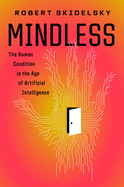
It's almost impossible to visit any news source today without encountering stories about artificial intelligence. Many of those pieces are framed either in enthusiastic or apocalyptic terms, with historical or philosophical perspective often noteworthy for its absence. In Mindless, Robert Skidelsky helps to fill that gap with a thoughtful reflection on the role of technology in the development of Western civilization and its implications for humanity's future.
Skidelsky, a life member of the House of Lords and Emeritus Professor of Political Economy at the University of Warwick, comfortably displays his erudition in disciplines that include history, economics, politics, philosophy, and literature. He marshals his sources carefully to lay a strong foundation for his own skepticism about the views of those who assert technology's unfailing benignity, explaining that this crisp survey--one that brings to mind the work of writers like Yuval Noah Harari and Steven Johnson--is "primarily about how western civilization came to be captured by the dream of utopia through science and about the successive stages by which this dream turned sour."
Even as he points to the "continuing threat" of technological innovation to "rob ever-larger fractions of people of their employment, livelihood, status, skills, usefulness and identity, and finally make them redundant," Skidelsky recognizes that we are in the early days of a debate on a subject with profound implications for the future of humanity. His contribution with Mindless is one that should stimulate that debate, rather than stifle it, and anyone who wants to consider some of the fundamental questions that beg to be asked and answered will find it a useful starting point. --Harvey Freedenberg, freelance reviewer

